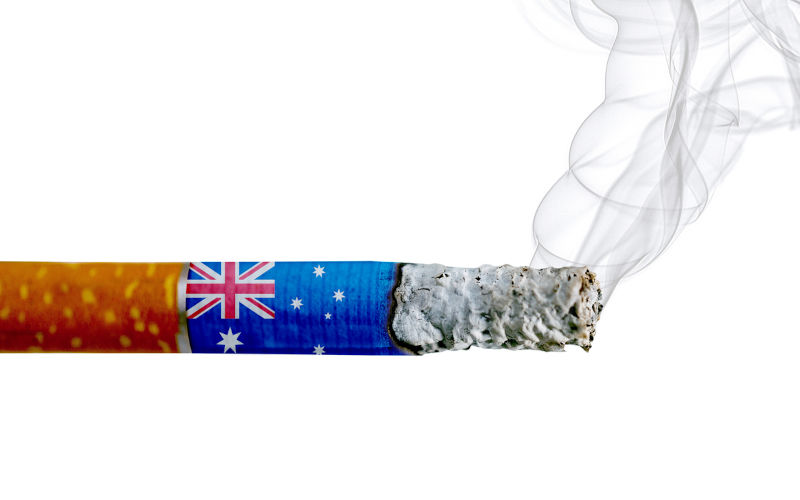Time to get real on taxing cigarettes and restricting vapes
August 23, 2025
Australia’s cigarettes are now the most expensive in the world. Excise has been increased cumulatively by over 340% in the past 20 years, clearly helping to depress consumption for many years.
But the effect of sky-high prices on cigarette consumption in recent years is less certain as smokers switched increasingly to much less expensive illegal supplies. Excise will be increased by an additional 5% in Australia on 1 September 2025.
The unintended negative consequences of the exceedingly high cigarette prices have been staggering. The independent economist, Chris Richardson, recently estimated that the revenue generated for the federal government may have been cut by as much as $10 billion annually. Untaxed and unregulated black market cigarettes sell for about a third of the cost of taxed, legal cigarettes. On the ABC website, economist Alan Kohler has also recently deplored the severe unintended negative consequences of the high and increasing rate of cigarette excise and severely restricted availability of nicotine vapes.
New restrictions on the availability of nicotine vapes were introduced in 2024. Australia has, for many years, had the most restricted availability of vapes of any Western country. More than 90% of vapes in Australia are now supplied by the black market. After the New Zealand Government decided to make safer, smoke-free nicotine vapes more available than cigarettes in 2020, smoking rates fell twice as fast in the general population and three times faster among disadvantaged populations in New Zealand compared to Australia. Australia has a substantial black market for vapes but there is no evidence of an equivalent vape black market in New Zealand.
The growing black market for cigarettes, tobacco and vapes in Australia has become increasingly violent, with several homicides attributed to criminal gangs fighting for control. There have been more than 230 arson attacks on tobacconist shops in Australia. Extortion is rampant. The Roy Morgan polling company recently reported an increase in smoking. The lack of benefits and the severe adverse effects of Australia’s tobacco and vaping policies should have made these policies unsustainable long ago.
While the cigarette excise and vaping restrictions have failed abysmally as policies, they have continued to work effectively as political strategies like many other prohibitions in Australia including the bans on off-course betting on horse racing, voluntary assisted dying, same-sex sex, marriage equality, commercial sex and abortion. All of these bans lasted many decades, long after it was clear that adverse effects exceeded any benefits. Most were accompanied by nasty, unintended consequences and many were also accompanied by widespread and serious corruption of police. Often, severe restrictions are difficult to differentiate from straight out prohibitions.
Most political parties in Australia accept the huge black market in cigarettes and vapes while pretending not to. The alternative is to try to diminish or even eradicate black markets and implement policies to shift demand as much as possible from illegal to legal and regulated supply. The National Party and the Legalise Cannabis Party are the only political organisations in Australia which unambiguously support realistic and effective policies for nicotine vaping. All other political parties are either opposed or deeply divided.
The tobacco companies started to realise that cigarettes and their business model was obsolete decades ago. Some started transforming from companies making and selling combustible cigarettes to a range of safer, smoke-free nicotine-dispensing options. Phillip Morris International is the world’s largest traded tobacco company and has been rapidly transforming for some time. PMI has spent US$14 billion in the last 16 years developing a range of safer, smoke-free products. According to PMI’s official financial reports, in 2015 smoke-free products accounted for US$0.2 billion or about 1% percent of the company’s net revenue, but by 2024, smoke-free products accounted for US$14.7 billion or 40% of net revenue. Smoke-free products are now more profitable for PMI than cigarettes and sales of these products are growing rapidly while sales of cigarettes are barely increasing. Opponents of tobacco harm reduction underestimate the power of consumers and the commercial capability of the tobacco industry.
For many years, tobacco companies argued for the freedom of smokers to use a legal product when, and wherever, they liked. However, tobacco control won most of these debates around the world arguing that non-smokers had a greater right to breathe clean air. But surely smokers also have a right to use much safer alternatives, especially if they are paying for these lower risk products themselves? Restrictions on smoking in public places were assisted by increasing evidence that cigarette smoke harms bystanders. Although vaping opponents have claimed that vaping aerosol is also harmful to bystanders, the scientific evidence for this claim is extremely weak.
Debates about tobacco harm reduction are generally decided by scientific evidence. The scientific evidence advanced by vaping opponents is often deeply flawed. Findings from laboratory studies of vaping in animals often involve settings which no human would tolerate. Often, these researchers only report alarming sounding findings about vape aerosol without any comparison to the much more dangerous findings from cigarette smoke. These studies exaggerate the harms and underestimate the benefits of vaping and other smoke-free nicotine options.
Unless Australia starts reducing its exceedingly high rate of cigarette excise, a huge black market in cigarettes and tobacco will inevitably continue. Australia should follow New Zealand’s example of making vaping and other smoke-free nicotine products more available than deadly cigarettes. If New Zealand can do it, why can’t Australia?
The views expressed in this article may or may not reflect those of Pearls and Irritations.
